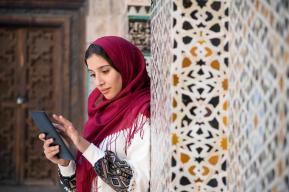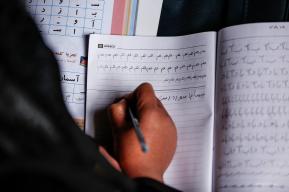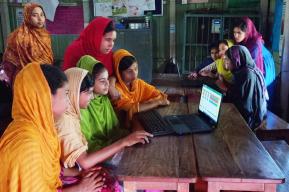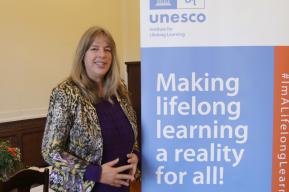News
Programme from UAE promoting Arabic language skills is awarded the 2022 UNESCO Literacy Prize

Madrasa is awarded the UNESCO King Sejong Literacy Prize for its programme ‘Madrasa Arabic lessons’.
Madrasa is a leading e-learning platform launched in 2018 under the umbrella of the Mohammed Bin Rashid Global Initiatives (MBRGI). The platform aims to respond to the need to develop and enrich Arabic educational content and make it accessible to the largest segment of students. It provides exceptional Arabic language educational content for all subjects like science and mathematics for free.
The programme ‘Madrasa Arabic lessons’ provides basic literacy skills in the Arabic language along with the core subjects, and supports distance learning through innovative solutions enabling learners to access high-quality education. The lessons, in line with the Arabic language teaching curricula approved in several countries, are prepared by the Madrasa team together with a committee of experts, educators, academics and university professors specialized in developing educational content. They are built following a gamification approach, in order to enhance motivation and interactive skills, creating a healthy competitive environment for students where fun is combined with education. Students can therefore interact and engage with video-based content, where each subject is presented as a distinctive cartoon character in a story-like style.
The idea of developing the programme was driven by the lack of high quality and publicly available Arabic digital educational content worldwide. Dr. Waleed Al Ali, Advisor to Mohammed bin Rashid Al Maktoum Global Initiatives (MBRGI) and Secretary General of Madrasa shared that, “although Arabic is one of the six official languages of the United Nations, surprisingly, only 3% of digital content worldwide is in Arabic. Therefore, as the Arabic language is the United Arab Emirates’ (UAE) mother tongue, Madrasa took it upon itself to contribute to the library of Arabic content available online”.
Being a student-centric fully virtual platform, Madrasa allows children, parents and teachers to access quality learning resources anytime, anywhere, “transforming any space into a learning space” to respond to the evolving needs of all learners, through an efficient and innovative use of digital technology.
“Having accumulated more than 3 million users across 50 countries, Madrasa is a testament to the UAE’s efforts to support people regardless of where they may be,” explained Dr. Waleed Al Ali. Since its inception in October 2018, more than 75 million lessons have been provided to Arabic learners from around the world and Madrasa Arabic 688 videos received 38 million views to date.
With the outbreak of the Covid-19 pandemic, Madrasa was able to broaden its scope of action and launched the “‘Madrasa in a Bag”, a classroom in a bag, containing Madrasa’s whole library of content and material, ready to be deployed anywhere without the need to connect to the internet. In this way, Madrasa was able to support students and education authorities around the world, reaching the leaners most at risk of being left behind and marginalized. For this reason, Madrasa was also one of the recommended online learning resources by UNESCO, ISESCO, and many education ministries in the Arab world.
In the future, Madrasa is committed to improve and broaden its learning content, in response to the ever-evolving educational landscape worldwide. As Dr. Waleed Al Ali expressed, “there is always room to grow and develop further, and we warmly welcome collaborations that enrich our platform’s educational content”.
For the International Literacy Day, Dr. Waleed Al Ali shared an encouraging message, “I would address all stakeholders in the educational ecosystem worldwide, from teachers to students, and institutions to governments, to reiterate the significance of unifying efforts and collaborating in the global battle against illiteracy. We must also recognize the potential in utilizing innovative technology to broaden the reach of education. These two factors, together, will contribute to achieving Sustainable Development Goal 4, aiming to ensure inclusive and equitable quality education and promote lifelong learning opportunities for all.”






